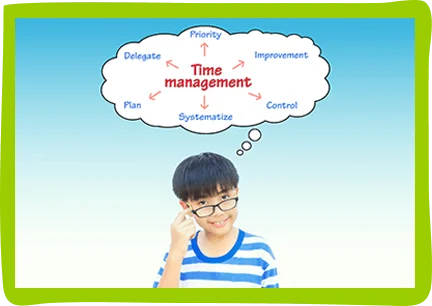The Time Management for Child’s Success

The TIME-MANAGEMENT doesn’t mean time-table for study or activity. The Time Management also doesn’t mean to keep the child running with the clock, but, necessary to develop a sense to understand it.
- The Time-Management means to manage quality-time for the child from the total time available by you.
- The Time-Management means management of in perception of the age of child, what should he be shown, which places he should be taken, and what reading he should be offered.
- The Time-Management means to develop maturity of adaptation of child’s changing emotions, sensitivities, demands, requirements, facilities, freedom and trust with his changing age.
- The Time-Management means to plan-out the opportunities for the child in the extra-time he is having besides the study-time.
- The Time-Management means to make a balance of time that due to study the child is not deprived of his childhood, life doesn’t become a burdensome, not engulfed in the competitions, and happiness and liveliness don’t vanish from his innocent eyes!!
- The Time-Management means the child passes his childhood in happiness yet he learns everything essential.
- The Time-Management doesn’t mean to memorise the questions and answers of the lesson on Gandhiji but to manage to visit his famous Sabarmati Ashram to peacefully make deliberation on the values of virtues in the life of Gandhiji.
- The Time-Management means an art to make relativity with the speed of the time-clock.
- The Time-Management means a perfect formula consisting of speed, power and accumulation for the growth.
- The Time-Management means to develop a skill into the child so that he can match himself to keep pace with time and tide.
- The Time-Management means the child himself performs the task and the parents help him into understanding it. The management to prepare the child for forthcoming situations, challenges, questions, to understand the problems, all these means the time-management.
- To set up a calendar, a pencil and a day-planner on the study-table or into the study-room of the child so that he can learn to make planning for the coming days.
- A table-clock should be placed on his study table and to make him understand that how to finish the home quickly so he can spare time for sports and Television.
- The parents should set a well planned time-table for self and should discuss in a manner that the child understands it and show that how punctual they are about their time-table, and then the child quickly learns The Time Management.
- The Time-Management means how to divide the works into small modules, to teach the child how to bifurcate the preparations for the exams. For an instance, when only 30-days are left for the exams then whether to make a perfect plan for him running up to the day before the exams or just to give him advices and instructions and leaving rest on him.
- To maintain a time-diary to make him to realise that in which activities how much time he has wasted.
- Include him in the planning and preparation for activities like tours, cleanliness, kitchen, arrangements and so on.
- As he develops his habit and skill to wake up on alarm time, to get ready neatly and timely, becoming punctual about time, and so on then he should be appreciated for these and be rewarded with something.
- The Time-Management means to teach the child how to save time, how to shorten or speed-up the task, what preparations should be done before the time of task, how to think ahead of time, not to lose against time, not to see the time in frame of period, days, months or years but in the purview living and life.
- The parents should develop a habit in the child to use the internet for learning time management through Online Time Management Game and other similar information.
- The students lately filling forms for the competitive exams, candidates arriving late in the exams, the employee arriving late in discharging their duties, the leaders coming late at venue to deliver the public speech and organisers starting the programs later than scheduled-time are the victims of the Poor-Management. Even if these people are strong, the circumstances and success do not give support to them for long.
As very well said by MARC LEVY
“If you want to know the value of one year, just ask a student who failed a course. If you want to know the value of one month, ask a mother who gave birth to a premature baby. If you want to know the value of one hour, ask the lovers waiting to meet. If you want to know the value of one minute, ask the person who just missed the bus. If you want to know the value of one second, ask the person who just escaped death in a car accident. And if you want to know the value of one-hundredth of a second, ask the athlete who won a silver medal in the Olympics.”





